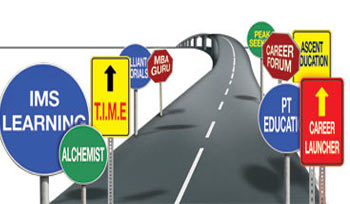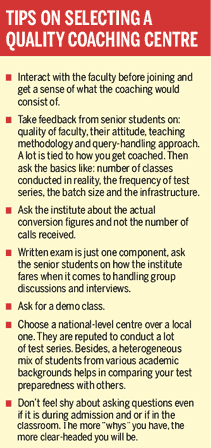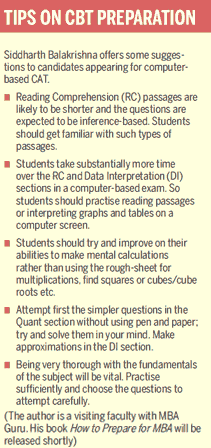
Close your eyes to picture a lean old man, wearing a dhoti, bare-chested, slightly bent, holding a staff to support his thin frame and walking at a hurried pace, showing a sense of urgency. Picture him again. What is the colour of the dhoti you visualised? Is it white or cream or pale yellow? In a majority of cases, individuals don't think beyond these colours. Some of you will also picture the old man as Mahatma Gandhi. Go back to your kindergarten days. A for? You will invariably blurt out 'apple'.
But, what has the Common Admission Test (CAT) got to do with these examples? Or for that matter, the coaching centres that prepare students for the CAT? The answer is: A lot.
But first, what is CAT? It is an entrance exam for the IIMs and other noted B-schools in India that qualifies a candidate to secure a seat in Master of Business Administration (MBA) programme. But passing the written test is not the only criterion. A prospective student has to clear Group Discussions (GD) and Interviews as well. The IIM's minimum cut-off score is anywhere between 99.7-99.9 percentile. Students scoring less have the choice of other B-schools. The CAT exam is held once a year and is on Math, Data Interpretation and English. The questions, with negative marking, differ in each test. There is no set pattern.
What does the CAT assess?
The CAT tests one's ability to think beyond the obvious. And obvious implies what has been dinned into an individual's head for years in educational and social circles. So while Apple is recited without strain, the brain requires a bit more effort to stretch out for unconventional alternatives such as arc, ape, arm or actor. How many have been given exposure beyond the obvious words, or will be given in the future?
The coaching centres preparing students for the CAT tutor the mind to think beyond the apparent.
The CAT checks the logical reasoning power of students, says Neelesh Kossambi, national manager, media marketing of Mumbai-based IMS Learning that has been coaching MBA aspirants for the last 31 years.
R Shiva Kumar, director, Academics and R&D, Career Launcher, reiterates the same thought. Most problems check the ability of the student to apply the fundamental concepts in situations that are not direct, he says.
As corporate businesses grow, they relentlessly hunt minds that think differently. We need brains that are capable of providing quick and deft solutions to the real issues, says a human resource manager snapping his fingers. So the remuneration has to be equally attractive, he adds.
So, it's a small wonder that MBA aspirants are ready to pull out all the stops in a bid to crack the CAT. The prestige of being associated with the IIM brand in addition to a golden wage packet is reason enough for dreamers to get cracking.
Catering to the hope are numerous coaching institutes. In the last eight to 10 years, a number have sprung up in almost all corners of cities and are highly concentrated at colleges and youth hang-out points. Huge hoardings of various hues and shapes jostle for eyeballs. But do students necessarily require Coaching Centre (CC) tutoring? Among many nods, there have been quite a few emphatic opposite views as well.
Careers360 is a complete career magazine.

Manek Daruvala, founder-director, Triumphant Institute of Management Education (TIME), feels that CCs provide a competitive environment to students, helping them to benchmark their preparedness vis-a-vis other students.
Besides, how many students would have the self-discipline to study on their own, asks the Hyderabad-based IIM-A graduate, who started TIME a good 17 years ago. Chennai-based IIM graduate Mythili Balakrishnan has a different opinion. She says, "A considerable number of IIM students don't take any coaching."
Tusharika Sinha, who graduated in 2003 from IIM-A, now a senior partner in iCresset Talent Solutions, prepared on her own. She subscribed to the coaching material of IMS Learning, Mumbai on an IIM graduate's recommendation. "It gave me a very good understanding of question pattern and enabled me to perfect time management, which is one of the most critical aspects in clearing the CAT," says Sinha.
Abhishek Sharma, a self-coached IIM-Indore graduate, didn't go about scrutinising one coaching centre from the other either. He decided to bell the CAT on his own. Ten years ago there weren't many coaching stations, concedes the 35-year-old who also got selected at IIM-Calcutta.
Now working as a brand manager with US-based Becton, Dickinson and Company, Sharma reveals the secret of his success. Hard work, being part of a like-minded group and studying from quality reference material.
Sharma adds humbly, "I don't consider myself to be exceptionally gifted. I disciplined myself to study hard and formulated a few techniques." He recollects the preparation days at Udaipur, where he was an engineering student. Getting up early for a walk in the calm, cool mornings with his friend, preparing for CAT, taking two mock tests and then settling for college studies before heading for the college. His memory plays out clearly.
"After getting back from the college, both of us used to check the results to analyse and identify the weak areas to work on them the next day," recollects Sharma. The routine continued uninterrupted for 14-15 months. "While my Math was strong, I knew I had to work on my vocabulary and comprehension." So, an unrelenting spirit made him work harder. He made 10 cards of new words every day from the Barron's guide to the SAT by Brownstein and Weiner, keeping the cards in his pocket and shuffling them all day long to honour his target of learning 10 new words a day. Needless to say, self-training didn't fail him.
So, how do CCs contribute? "They are instrumental in providing guidance, mentorship, benchmarking and time management to students," says Shiva.
But a few dissenting voices flag a different argument.
Points to ponder
"I would question the quality of tutoring carried out at quite a few coaching centres," says a candid Balakrishnan. "Most faculties have themselves not been able to clear CAT, so imagine what would they be teaching the students?" Her caustic tone is laced with concern.
Prashant Monga of Delhi-based Alchemist, a CAT training Institute, expresses a similar concern. The logical subtleties get lost in the face of standardised coaching, he feels. Monga abandoned a lucrative corporate career in a bid to satiate his craving for teaching. Alchemist, was therefore, born in 2006. The teaching methodology followed in the centres need a major overhaul, says the IIT and IIM graduate who experienced some classroom teaching when he had to join one on his parents' insistence.
How is it possible that such a major fundamental flaw in the pedagogy has been overlooked by the institutes over the years?
At present, coaching centres impart knowledge-based training, but the actual need is for intelligence-based training, stresses Monga. Intelligence-based training can be applied in unfamiliar problem-solving areas also, he adds. Why is it difficult for individuals to think of a different-coloured dhoti, one could argue. The logic feeds on self. The CAT questions don't follow a template. Rote-learning doesn't work for the CAT. It may work for school exams or exams conducted for other high-profile bureaucratic postings, says Ravi Sonthalia, a 2009 IIM-Bangalore graduate.
The CCs need to adopt a tutoring technology that sharpens the thinking ability of an individual concurs Balakrishnan. So, even when a student is faced with a question he has never tackled before, his attempt speed doesn't decrease, she says.

In most cases, questions asked by students are standard: on fees, timings, number of classes, test series and on reference material. Affordability of fees is looked at, and convenience of commuting figures in the list. The students look at results claimed by institutes says Shiva of Career Launcher. Students hardly question or investigate faculties' academic background or even the teaching method. Even in the classroom, some never ask a question fearing being ridiculed. I never asked a question concedes one girl-student who took coaching from TIME, at Delhi's Kalkaji branch.
All these suggest that the entire approach of students too needs a re-visit, says Balakrishnan. Probing questions should be asked in a bid to zero-in on a good centre. And the adverts should not be the sole factor guiding the admission decisions.
Divya Nehlani, currently taking coaching at IMS Learning, Santacruz centre at Mumbai, says she opted for IMS Learning looking at the history of successful candidates who were able to make it to the IIMs. "I knew a few of them personally," says the 20-year-old.
The number of interview calls that an institute gets does matter but it is different from the actual conversion numbers, ie number of students who actually secure a seat. Remember, there are GDs and interviews that need to be cleared to qualify for a seat.
Data of the last two or three years would give candidates an idea about the conversion rates, says Jitin Chawla, a Delhi-based career counselor.
Don't be surprised if a whole lot of CCs circumvent this specific query and veer towards rattling about the number of calls that their students got. And usually, the figures flung around sound impressive. However, it is imperative that students should verify the two -- the number of interview calls that a student receives from IIMs and the number of students who clear the GD and interviews to get admission.
Sonthalia says he trusted his instincts when it came to choosing Alchemist. "I choose a non-household name trusting my instincts after speaking to the faculty," says the 24-year-old. "CAT is an aptitude test and the training should be focused on honing of thinking skills," Sonthalia reiterates the thought. The seemingly sharp youth, goes on to reveal why he felt the need for an coaching institute. "I didn't want to risk my chances," he confesses.
Operating with a cause
Disparate arguments apart, an undeniable fact is CCs are aware of their reputation being hinged on successful conversion numbers. Therefore, institutes waive some fee amount and offer discounts to meritorious students. The waiver is also open to potentially bright students from weaker sections of the society. In a normal course, a CC's fee ranges anywhere between Rs 20, 000-30,000 for the complete course to as much as Rs 12,000 for short-term courses. The discounts offered by various tutorials are to the tune of 20 per cent and above for meritorious students as well.
TIME has institutionalised the process of tests, and depending on the marks discounts are given. IMS Learning gives students discounta from 20 per cent which go up to 80 per cent in certain cases. "Now we have also launched a Corporate Social Responsibility (CSR) campaign recently," says Kossambi. While the tutoring institutes are doing their bit to help potential talent, the other area where students now need aid is CBT or the computer-based test. The recent announcement of IIMs to switch over to CBT has caused immense flurry among the students.
Online vs compter-based test
The format of CAT has changed now, moving from traditional pen and paper to Computer-Based Test. CBT requires a new approach to crack the test. It is not an online exam but merely a departure from the conventional format. The actual exam pattern or questions are not expected to be very different from the traditional CAT paper, says Siddharth Balakrishna, a visiting faculty at MBAGuru, a CAT coaching centre. It is not difficult to acclimatise with the new trend, he adds (read Tips on CBT Preparation).
A visit to www.catiim.in can address the other queries that students have. The online CAT preparation is contrary to the standard trend. The online format system hasn't picked up in true form in India because of poor technology and bad connectivity. But the students can get a low-cost online offering, says Srini Krishnamurthi, managing director, Expertus. It's an inexpensive alternate and offers flexibility of timing. For preparing online, students can purchase online assessments and study material, says Krishnamurthi.
However, the question is: should an individual join a CC or prepare on his own? Well, if you are self-motivated, self-disciplined, can criticise and analyse your work impartially, you can crack the CAT. The only other crteria are knowing the technique of approaching the questions and forming a compatible group to assess performance routinely. But if you are lacking in any of the parameters, it's best to enroll in one.
Remember, belling the CAT is ultimately in your hands.